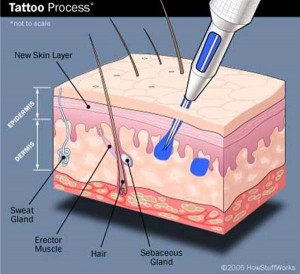Skin cells continuously shed and regenerate, so how does the ink of a tattoo stay permanent? While the outer layer of the skin, the epidermis, regenerates and sheds throughout a person’s life, a deeper layer, the dermis, does not. Tattoo ink penetrates into the deeper dermis where more permanent cells, as well as blood vessels, nerve endings and glands, reside in a collagen fiber meshwork. The outer epidermis takes up the ink as well, but this layer is shed in a few weeks and the ink is left permanently in the dermis, dark enough to be seen through the new layers of epidermis that will be produced.
The body does have a reaction to such deep injury. A tattoo is an insult to the body and provokes an inflammatory reaction. A type of white blood cells called macrophages migrate to the tattoo site and ingest the ink particles. Some macrophages are able to dispose of the ink, but many become permanently stuck in the dermis along with the pigment particles that are too big to be ingested. The immune system will continue this fight and slowly break down the ink particles over the years. This is what causes tattoos to fade. Keeping out of tanning beds and using sunscreen can slow this fading as UV light breaks down tattoo ink particles, making them easier for the immune system to clear them.
If tattoos penetrates so deeply in the skin and are so permanent, could they raise any health concerns? Tattoos are generally safe and the vast majority of them never cause a serious medical issue. There are, however, a few things to be aware of as well as some common sense precautions to take.
 According to the American Academy of Dermatology, one of the most common health issues with tattoos are allergic reactions. Itching, bumps and rashes at and around the site of the tattoo characterize these and are caused by a hyperactive immune response to the tattoo ink. Red ink is most commonly associated with allergic reactions, but blue and green inks can cause them as well. People with skin conditions, like psoriasis and eczema, may see a flare-up of their condition after getting a tattoo.
According to the American Academy of Dermatology, one of the most common health issues with tattoos are allergic reactions. Itching, bumps and rashes at and around the site of the tattoo characterize these and are caused by a hyperactive immune response to the tattoo ink. Red ink is most commonly associated with allergic reactions, but blue and green inks can cause them as well. People with skin conditions, like psoriasis and eczema, may see a flare-up of their condition after getting a tattoo.
More serious medical issues include the transmission of hepatitis B and C as well as HIV, which has been known to occur with tattoos. These infections can be prevented with the use of sterile needles and equipment. Bacterial infections due to contaminated tattoo ink has also been documented. A study published in the New England Journal of Medicine in September 2012 investigated an outbreak of tattoo related non-tuberculous mycobacteria the previous year in Rochester, NY. This bug causes painful, itchy pustules and red bumps within a tattoo in the first four weeks after obtaining it. Researchers identified Mycobacterium chelonae from 14 patients and traced the source of the infection to premixed grey ink used in the patients’ tattoos. This bacteria was also found in unopened bottles of the ink and resulted in a recall by the manufacturer.
Although not a clinical concern, some may be alarmed to learn that laboratory studies have shown an increased risk in developing cancer in cells and animals from chemical carcinogens present in some tattoo inks. The studies, however, rely on chronic dosing of cells lines and animals with the chemicals. A tattoo would not give a person this type of chronic exposure and rest assured, there is no significant increase in the incidence of cancer among people with tattoos.
To minimize the chance of complications from tattoos, the American Academy of Dermatology advises a few things. Only go to a professional tattoo parlor and artist who is licensed according to the state’s requirements (a list of more than 300 licensed tattoo artists and parlors in Rhode Island can be found at health.ri.gov). Insist on seeing equipment in sterile packaging to avoid any contaminated needles. People with chronic skin conditions, such as eczema or psoriasis, should seek the advice of a dermatologist before pursuing a tattoo. Avoid tattooing over existing moles as this can obscure changes that occur and potentially make spotting the development of skin cancer more difficult. If a reaction does occur, report it to your tattoo artist and seek medical care if it lasts more than a week.